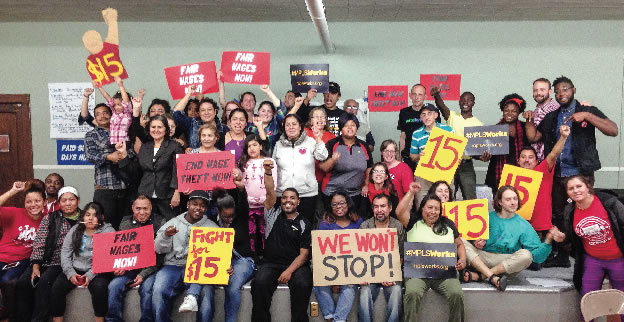

Share
Fresh on the heels of strikes and other actions by low-wage workers, a new report provides more insight into the struggles faced by janitorial, restaurant, retail and other workers in the Twin Cities.
“Confronting Exploitation: The Face of Low-Wage Work in the Twin Cities” was released Thursday by the Workplace Rights Defender’s Committee of CTUL, Centro de Trabajadores Unidos en Lucha / Center of Workers United in Struggle.
“The report lifts up many of the conditions that are causing workers to take action,” said Terin Mayer, lead organizer for the committee.
Organizers surveyed 173 workers in July and found:
- The prevalence of poverty wages across multiple low-wage industries, with the average wage for workers responding to the survey well below the poverty level;
- Widespread wage theft across all industries surveyed, including half of all respondents reported facing wage theft directly;
- Lack of sick time as the norm, with 64 percent of survey respondents going to work sick due to lack of paid sick days access;
- Unfair, erratic scheduling disrupting worker’s lives and family well-being, including 32 percent of respondents with schedules that rarely or never allow them enough time to sleep;
- Unsafe working conditions all too common and with on-the-job injuries at 20 percent, far above the national average of 3.3 percent;
- One-third of the respondents faced employer retaliation and threats, including termination, cutbacks on hours, and calls to police and immigration agencies;
- Subcontracted and contingent work adds to the complexity of the problems.
In a phone call with reporters, several workers described instances of not being paid, of not receiving pay stubs and of being subject to retaliation when they spoke out.
But they also cited reasons for hope.
Lucila Dominguez said, “I had been going from job to job to job, experiencing wage theft at each one.”
After connecting with CTUL, she learned about her rights and has been active in fighting wage theft. To date, CTUL has recovered more than $1.8 million in lost wages for employees in low-wage industries.
Lilia Lopez, a 15-year employee of a dry-cleaner featured in the CTUL report, related her experiences on the job.
“The machines at my drycleaning job are so old and some of us have gotten burned,” she said. “We lack any paid sick time. One of our co-workers left and my employer didn’t replace her, increasing our workload with no additional pay.”
Through her involvement with CTUL, she organized with her co-workers and was able to get the employer to increase wages, “the first time I’ve been able to make over fifteen dollars an hour.”
Michelle Garnett McKenzie, advocacy director for the Advocates for Human Rights, partnered with CTUL to analyze the results of the initial round of surveys.
“Labor exploitation is, at its heart, a human rights issue,” she said. “Locally, as well as nationally, we have a complex, outdated worker protection system exacerbated by a fissured workplace. The analysis contained in this report is a huge step forward in articulating these complaints accurately, which is helpful for enforcement agencies and public policy advocates alike.”
Dominguez said enforcement must be coupled with power for workers.
“One of the key findings of this report is that the workers’ voice really needs to be lifted up,” she said.

